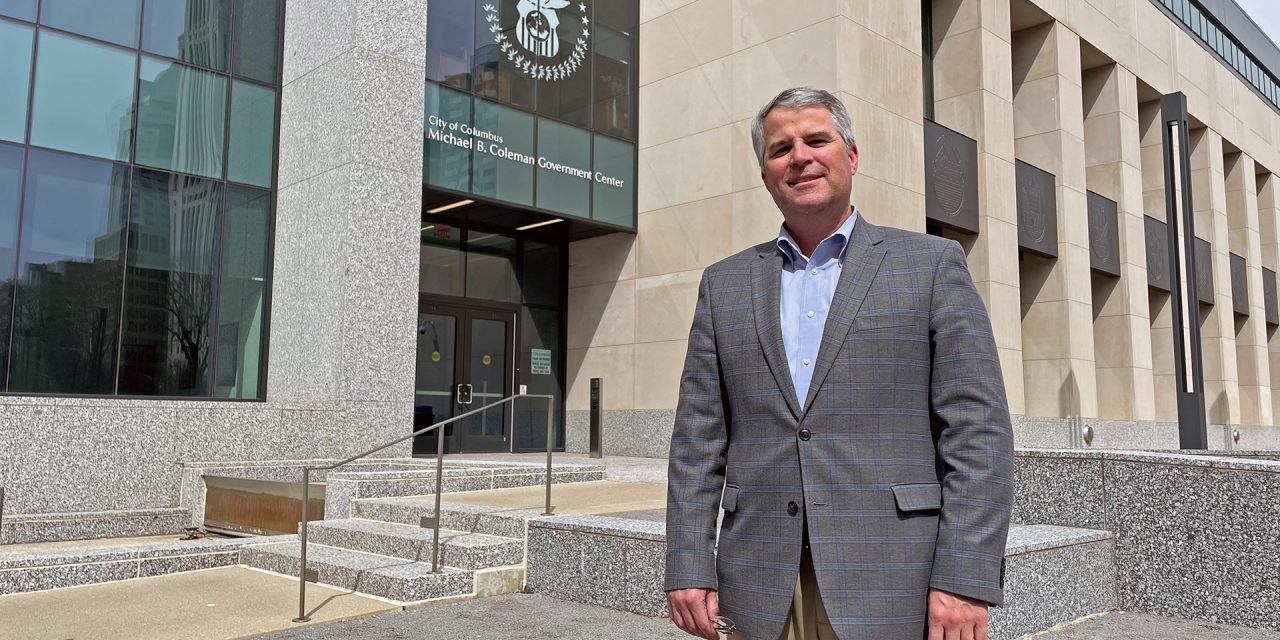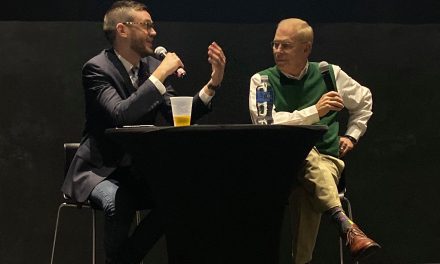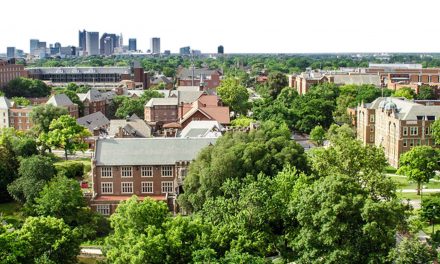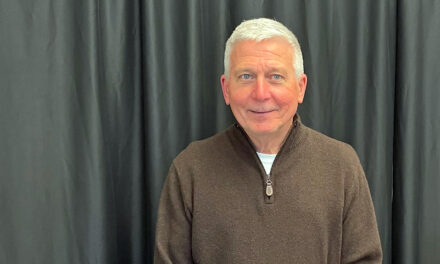Podcast: Play in new window | Download
Subscribe: RSS
Tim Fulton 00:13
Ladies and gentlemen, welcome to the confluence cast presented by Columbus underground. We are a weekly Columbus centric podcast focusing on the civics, lifestyle, entertainment, and people of our city. I’m your host, Tim Fulton. This week, at a time when the city seems close to a boom in terms of economic development. It also faces challenges with that growth. I sat down with the city’s director of development, Michael Stevens, to discuss the portfolio of the city’s Department of Development. How the department works to improve the lives of Columbus residents evaluating investments at a neighborhood level, how to maneuver the gaps between the needs of the city and the resources available, and how tax abatements happen in Columbus. You can get more information on what we discussed today in the show notes for this episode at the confluence cast.com. Also, the confluence cast is on Patreon. Find out how to support this podcast on our website, the confluence cast.com Or at patreon.com/confluence. The confluence cast is sponsored this week by the Mid Ohio Regional Planning Commission or more pcy. featuring stories about local and regional partners that envision and embrace innovative directions in economic prosperity, transportation, sustainability, and an inclusive Central Ohio Morrissey’s transformative programming, innovative services and public policy initiatives are designed to promote and support the vitality and growth in the region. For more information, please visit morsi.org. Enjoy the episode. Sitting down here remotely with the director of the Department of Development for the City of Columbus director Michael Stevens. Director Stevens How are you sir?
Michael Stevens 02:10
I’m doing great, Tim. Thanks for having me. join you today. How are you doing?
Tim Fulton 02:14
I’m doing well. I’m doing well. Thank you for asking. So first of all, give some idea of of your background. What brings you to the Department of film.
Michael Stevens 02:25
Yeah, happy to do that. So I’m a Buckeye, a couple of times over, came out here to Ohio to go to Ohio State and came back to get my Master’s in Public Administration. When I was getting my Master’s in Public Administration, I had the opportunity to intern in local government for the city of Dublin. When I graduated, I went up northern Ohio to Lake Erie to Huron, and I was I ran their street and water department. For coca I had the opportunity to come back to Central Ohio and the Columbus area which my wife and I love and her family’s in this area to be the Director of Economic Development for the City of Dublin. I did that for about five years and joined, left there to join Cardinal Health and be part of their corporate real estate group. It was when you do economic development long enough you have you hear from the private sector folks that telling kind of emphasizing how great private, you know, businesses and you know how screwed up government is. And so I said, well give it a try. Biggest bureaucracy I ever worked for. And when I had the opportunity to leave there and come to the city of Columbus as their assistant director for economic jobs and economic development and later Deputy Director for jobs and economic development. I jumped at that. Okay, as a Buckeye and someone who loves Columbus, it was it was a great opportunity to have someone who loves local government, local government management has a great opportunity to be on the forefront of what’s going on in the Columbus area. spent five years with the City of Columbus and Department of Development when left to go to Lake County, Illinois, which is just north of Chicago. So it’s the county between Cook County and the Wisconsin border. And I ran up an economic development not for profit. Really focusing on some of the same things I was doing in Columbus about bringing jobs and investment. Really enjoyed that. But miss being in Columbus had the opportunity after Mayor Gaither was elected. And the City won the Smart City Challenge had the opportunity to come back as the Chief Innovation Officer for the City of Columbus and really lead the city’s portion of the US D O T Smart Cities grant and be part of smart Columbus which was a great opportunity. My family loves Columbus. I daughter who’s starting at Ohio State that fall. So coming back was a tremendous homecoming. And I gotta tell you, in the five years I was gone, the amount of change that occurred in this community and the investment that was being talked about when I worked here the first time and was made. By the time I got here, it was, it was tremendous. So I really feel like I’m blessed to be back at the City of Columbus at a time, that is really critical and how the next 100 years in Columbus are going to be, we successfully delivered the US D O. T grant. And during that time, Steve shoni, left to become city manager of Upper Arlington. Were asked if I could serve as the interim development director, which I happily said yes. And then during the pandemic, as we were addressing a lot of different issues that resulted from COVID. He asked to if it was okay to remove the interim tag and asked me, something I was very much interested in is to be the director of development. So that gets us to today. That’s
Tim Fulton 06:05
great. That’s great. And for those that aren’t familiar, can you sort of talk about the scope of the department and what all falls under your purview?
Michael Stevens 06:14
Yeah, happy to do that, we’ve got to what the one thing I’m really proud about. With the department development, we’ve got a great team of folks working really hard every day on improving the lives of Columbus residents, and making sure that the investments that are being made both on the jobs and economic development side as well, the housing side are serving all our residents. And really there, there’s a focus around equity and opportunity and, and wealth building that the department development has a lot of impact on. And the work we do is really critical to that. So we’re made up of four different divisions. One is our economic development division that works closely with one Columbus and our rate partners in the region and jobs Ohio, to encourage investment in new jobs within the city of Columbus. And really make sure that that income tax revenue stream that makes up about close to 80% of our revenue in the city continues to grow and stay strong, because that’s really important for those services that our residents rely on whether it’s police and fire refuse, recreation parks program is general fund funded program departments and programs is driven by that income tax revenue. So we have an economic development team that’s out there, really focusing on attracting jobs and investment, part of the Economic Development Division is our small business group. And they’re, you know, we really are ramping that up and making additional investment in their work to make sure those entrepreneurs and small businesses and neighborhood businesses and and some of those minority women own disadvantaged businesses have greater opportunity to grow here are our corporate leaders are important. But those small businesses and entrepreneurs we have lifting up, the work they’re doing is really critical as well. So that’s part of the Economic Development Division, we have the housing division, which is focusing on those programs that are making sure people are in safe and stable homes, and that they continue to stay there. And we’ve faced a lot of pressure over the last couple of years and will continue to face a lot of pressure around housing. And the work that they’re doing, the programs that they’re implementing both through local dollars and federal dollars, are really important to help people stay in their homes, or help projects be built that deliver apartments and homes that are affordable and we can maintain that affordability. So our housing division is on the forefront of that the Planning Division is is the group that engages with our community and develops those Neighborhood and Community plans on where do we want development to occur and how do we want it to occur? So it’s really important that you have a good mix of residential commercial retail and and how that land use falls into place. So that’s that’s our and then we have a number of Commission’s whether it’s the downtown area commission or Historic Resources Commission, and others that are staffed by our planning team, got a great planning team that is focused on how are we going to grow strategically, how are we going to grow up not out as much. So fortunate to work with them. And then the last group that division we have is our land redevelopment office, and they’re our land bank and so you Back in, you know, seven and oh eight, when we had a lot of vacant and abandoned properties, they would work through the tax lien process and acquire these homes. Some homes would have to be demolished others were in good enough shape that they could maintain them. And so they’ve managed those properties. But now they’re in a situation where we’re selling those lights or we’re selling those home homes, and seeing redevelopment occur and some of our opportunity neighborhoods to make sure that we’re providing home homeownership choices and rental choices through these properties. So they’re playing a critical role in how we address housing in our community. And then there’s one piece that I don’t want to overlook, it’s a really important piece is a lot of the city’s human service contracts are managed through development and our human services work. So work with our partners at CSP, or Michael Korea at the Human Service chamber and those members of his chamber, the funding that we provide through this city dollars and past couple years through cares dollars and rescue plan dollars is managed by the team, the Human Services team here and development.
Tim Fulton 11:12
And they are for the Human Services. Specifically, they are mostly administering those dollars, rather than administering the programs. Is that correct?
Michael Stevens 11:23
That That’s correct. And that’s okay. Clarification, Tim. We don’t have that subject matter expertise. So we’re working with those partners out in the community who are delivering those services and making sure that the funding that they’re getting, we’re holding them accountable, that they’re doing what they’re saying they’re doing. And then there’s on the federal dollars, there’s always reporting, so they’re, they’re managing those contracts and that funding stream.
Tim Fulton 11:46
Right. And that’s needed. I mean, that’s the accountability piece. Right. So with economic development, housing, planning, and then land redevelopment, I assume that those individual do you refer to them as they’re not departments, their divisions? Is that correct? Correct. Okay. I assume that they are not working in a silo, right, like they are not. They each have their own initiatives. But I imagine that there’s some virtue in the housing person, excuse me, the housing division, talking to the land redevelopment division, right? Can you talk about some of those synergies that you you’re trying to create there within the department?
Michael Stevens 12:30
Yeah, that not only within the department, but within the city with other departments, you have that cross functional coordination around efforts to address some of our bigger challenges as a community. But so we asked the team and I wrote, wrote, ran through the different divisions, but we have for the director here where we have have some real good senior leadership. We have a housing strategies, Assistant Director for housing strategies, we have an assistant director for growth strategy. And then our administrators who are running their divisions, that coordination between say housing, and economic development or economic development, and our land management or land redevelopment group is really important, because there could be opportunities, but we’re attracting a business or investment that there might be some land that we have in a neighborhood, that could be part of the economic development deal, but also investment in jobs and some of our opportunity neighborhoods. So I like to refer to him as a team. And I think that the leadership we have of these Division at the division level, was doing a nice job coming together and working as a team and coordinating I know, I meet with them on a weekly basis. And, and the purpose of that is to, to understand what’s going on outside of each division. And I’m more of a global perspective. And I feel strongly as part of my role is to kind of see that bigger picture and making sure that the different connections are being made, because a lot is being asked for these teams, and they’re running fast. And my job is to make sure there’s the connection, not only within the department, but other departments and other stakeholders outside the city. Organization.
Tim Fulton 14:12
Absolutely. And can you talk a little bit about the challenges that you’re seeing right now that are maybe different from when you were with the city before?
Michael Stevens 14:22
So I was with the city before during the great recession? So you know, there’s a lot of challenges now, but these are great challenges to have. We weren’t getting investment we were having trouble attracting jobs. Now. We’re getting at significant investment, not only city, Columbus but throughout the region around new jobs and opportunities for our residents. So what what the growth pressure challenges around the growth pressure, really focus on the biggest My biggest concern thing I think about every day is housing is we have we’re creating about two new jobs in this region and only building about half a house for each of those two jobs. So the house, the job, the house ratio is 2.47. That’s significant. That is providing a lot of pressure on the cost of homes and affordability. And it’s it’s a market thing, right? It’s a supply and demand. And what we’re finding is those residents who, after the Great Recession, we talked about, about 70% of our residents have, you know, came back and came back stronger and had some economic success, but about 30% was left behind. And what we’re seeing is they’re starting to catch up to where they were before the Great Recession, and then the pandemic. And when when the housing market tightens, it makes those individuals who have struggled, less housing secure and you know, are and what they’re doing, what that means is they’re paying more than 30% of their income for housing, and a lot of them are paying more than 50% of their income for housing. You know, our housing strategy is using different tools to make sure none of our residents are paying more than 30% of their income on on housing. So that means there’s tools around the bond package that voters approved in 2019, a $50 million affordable housing bond package, we’re using those dollars to help support low income tax credit deals, which are projects that are providing homes and residence to individuals making anywhere between 30% Ami and 80% ami. To put that in perspective, that’s an individual making somewhere between 27 and 65 $70,000. A year. You know, families of four, it’s a it’s a little bit higher, but it’s still I mean, it’s it’s those individuals, whether they’re healthcare workers, barbers, real estate agents, others in our community in these jobs, that’s who these jobs are for. So those low income are those homes, that we’re trying to protect and protect that affordability for those individuals who are working in our community. So we’re using that the bond package to fund Gay Pride gap financing for those projects to make sure they happen. couple examples of that is, yeah, we are working with homeport. And they’re doing a project out at Easton, the Eastern place homes, which is going to have, you know, initially 50 affordable units in Easton and those those live tech projects, really serving folks that can work and live and experience east and be there and make it affordable to them. Downtown topiary Park is being developed by the CDC Downtown Development Corporation. That’s 98 affordable housing units, and they broke ground on that a couple of weeks ago. So these are the types of projects that are providing how homes that are residents that are affordable for those members of our community.
Tim Fulton 18:09
That’s great. And then that focus is obviously super important. And what I’m realizing now is that you were part of a previous administration as well, being the Coleman administration. Can you talk about I’ve talked with Steve shoni, who’s now with a Burlington, previous director, can you talk a little bit to what you’ve seen as different focus areas that the city is really focusing on?
Michael Stevens 18:38
I think probably the most dramatic change is we’re really going into the neighborhoods and thinking about what type of neighborhood investment can be made. And in what type of mixed use development can occur there. So when I say mixed use, I’m talking about is there a component around housing? Is there a jobs component? Is there a retail component in these different neighborhoods? We have two great plans that our Department of neighborhoods led, we have the one lend and plan and the hilltop rising plan. And those are two communities and neighborhoods that unfortunately, had over the years had not gotten a level of investment committed with other parts of our neighborhoods, or city I should say. So that focus on investing in those neighborhoods. We’ve opened up a new Linden rec center. We spent a lot of time with the lead looking at Land Bank properties and housing and what can we do to encourage more jobs and investment in housing in Linden, hilltops? Similar, we look at the demographics of the individuals who are living in hilltop where they have opportunities to pursue jobs. In the last couple, six months, we’ve done a number of incentives for some projects over adjacent to the hilltop. that, you know, we call it proactive industrial development, we have a huge demand for some of these industrial warehouse space that is paying, you know, $20,000 more a year than what the average annual income is in the hilltop. So we’re, we’re incentivizing projects close to that neighborhood. So those residents have an opportunity to work in close proximity to where they live, make more money, and have some job training and some growth, professional growth with those opportunities. So that’s how we’re focusing our investment strategy through incentives and infrastructure dollars. Per the lead Mayor get there, it’s, we want to go into these neighborhoods and continue to invest in these opportunity neighborhoods.
Tim Fulton 20:47
For those that don’t know, and frankly, I am one of them. We talk a lot about and hear a lot about those incentives. Right. And what we’re talking about here is tax abatements. If I’m not, if I’m correct, that’s one of the tools Correct, yeah. Okay. So is it your team who’s identifying working with the private sector? And saying, Yeah, I think maybe we can offer you this, if you’re willing to make a commitment to build here, stay here, generate X number of jobs. And that’s part of the agreement, you then are making a recommendation to council, you know, could you vote on this and approve it, please?
Michael Stevens 21:27
Yeah, so that’s exactly how it works. Our economic or economic development team works with those individuals who are looking to make investments and add jobs to the city. And we talk through, you know, what kind of gap exists between the in the project so but for that incentive, the project wouldn’t happen in Columbus. And so we use those tools to close the gap. But it’s more about incentivizing opportunities for those residents, like in the hilltop, and looking at what were spent a lot of time looking at the demographics on how much are they making? How far are they driving to get to work? What other barriers are there to wealth building that exists? And how can we use our incentive tools to encourage investment that are there in proximity to a neighborhood like hilltop and those jobs and make sure we’re investing incentivizing jobs that pay considerably more than the average annual wage residents in hilltop are earning. So we want and that also helps address the affordability issue around housing. If you pay more than 30% of your income on housing, if we find a way to opportunities for you to earn more money, that percentage you’re paying on housing is going to go down. So that it’s they’re not mutually exclusive. When we talk about economic development, and we talk about housing needs, there’s a connection there.
Tim Fulton 22:53
How does that conversation start from a incentive? Perspective? Is it you guys are identifying gaps? And there’s some sort of request for proposal process? Is this a, the private sector comes in and says, Hey, we’re thinking about coming here? Here’s what we’re talking about. Is this appealing to you? And could I please have some incentive?
Michael Stevens 23:19
So a lot of awards starts in, it’s those locally. We work closely with one Columbus, and they have a pipeline of projects that they are and prospects that they are working with throughout the country. And as those companies or developers identify, say, parcels or property that meets their criteria. And we get engaged and try to understand what they’re what they’re trying to accomplish, you know, how much how much are they going to invest? How many jobs are going to be part of that investment? How much are they paying on an annual average basis? What are they doing to train and to track their workforce, and understand that, and then understand the impact of that investment to our revenue stream as a city. And then we we try to identify the gap because it’s a competitive process. So we’re not only we competing with communities throughout Central Ohio, but we’re competing competing with communities across the country. And we try to identify what’s the gap between making this project work that the specific project in Columbus versus another finalist they’re looking at and we try to close that gap through incentives. We typically use not the full amount that the the private side is looking for. But we come to that and we look at all that and then make an offer. And then we work with city council to bring forward legislation that authorizes some type of incentive agreement based on those inputs that you know the the number of jobs, the investment, the commitment to workforce and the community. And then county council, I’d say they have a very robust and vigorous vetting process on that issue. You know, we talk about it at our briefings, it’s something that is addressed to the council. And they make clear what their priorities are. And we, you know, we don’t bring forward projects that don’t make a significant enough investment or don’t pay enough. They’re not going to incentivize, we incentivize our public policy priorities. And that’s around good paying jobs, workforce training, as well as contribution to the community.
Tim Fulton 25:41
And I was my net, and you touched on it a little bit, but I just want to ask for the naysayers. What is the accountability mechanism for they’ve promised? Let’s say it’s 100 jobs, they’ve promised 100 jobs. And after the predetermined amount of time, they’re not fulfilling it? What is the mechanism there? Is it that they signed an MOU at the beginning that they’re not fulfilling? Or how does that work?
Michael Stevens 26:08
So as part of our incentive agreements, have a reporting requirements where they, you know, they have a certain number of years to ramp up on the hiring, and every year, they need to report that to us. And then we have a tax incentive review council that meets annually, that reviews each and every incentive, and and the commitments behind them. And if they’re falling short, the council sometimes asked staff to go the tax incentive review council asked staff to go and engage with the company to understand, you know, if the current was 100 jobs, and they’re only at 80. Why is that? And then, at times, if they aren’t living up to the commitment aren’t paying the wages that they said, then the tax incentive review council would recommend that we dissolve the incentive. And then that goes to the overall recommendation from the tax incentive review Council goes to city council, within 30 days of the tax incentive review council meeting, council then puts it on their agenda discusses it in either accepts the recommendations or, or not, historically, they have accepted the recommendations, and then a dissolution as part of that recommendation, then we’ll follow up and bring legislation specifically to dissolve that agreement. What we have found is 95% of our deals exceed their job projection number and their investment number. Okay, some that don’t we work with, and others, we’ve dissolved, but the majority of them are performing and exceeding their commitments.
Tim Fulton 27:47
Gotcha. Anything else? That’s right over the horizon for you in terms of what the department is taking a look at,
Michael Stevens 27:56
we’re really trying to figure out this return to work and how the pandemic is impacting how people are working, and are they coming, there’s gonna be a big push on going, coming back to downtown, and we’re at a point where the, the level of the rate of infection has decreased significantly, and it’s safer to be in environment and working together. You know, I spend a lot of time thinking about okay, how are, how are people coming back downtown? How are we encouraging them to come back to downtown and other job centers into the office? And then how do we make sure that those other supporting type of businesses, whether it’s restaurants or other, you know, are they still viable enough that you know, what, what makes downtown vibrant is having the people here and being may not only be able to work here, but to go and to eat and to hit, you know, go to the plays or one of the theaters, and it’s really important that we see more and more people coming back downtown, and we’re hearing from some of our businesses that that’s what they want to do, and their employees want to do that. So I’m encouraged that we’re going to, well, hybrid, managing that hybrid kind of structure is going to be important. Next couple years. Being in the office is going to be a critical part of that.
Tim Fulton 29:11
Got it? I end these interviews the same way every time. And I think your your answer will be an interesting one is I asked, What do you believe Columbus is doing really well. And then followed up with what is Columbus not doing so well or could do better?
Michael Stevens 29:32
I think what Columbus is doing really well and has done well for a really long time it is we’re an open, welcoming, accepting city. And we continue to do that, especially in the in the larger political environment across the country. These are challenging times. I think one that stands out and it’s openness. And I think that is resulted in us attract continue to attract jobs and investment. So clearly, I think we’re doing that well. And we have some great partners. where we could do better in as a region, we need to come together and figure out how do we continue to encourage more housing growth and more housing investment, or we’re about 60% of building, we’re only building about 60% of the housing capacity that we need. So as we review our housing, our zoning code, as the city reviews, different tools that can use to encourage more investment in housing, our neighbors, our Suburban, community, neighbors need to be looking at that as well. And we need to approach this as a region to address our housing needs. And that that is something that can we can always do better on.
Tim Fulton 30:44
Got it. Director Stevens, thank you so much for your time today. Hey, thanks, Tim. I appreciate it. Thank you for listening to the confluence cast presented by Columbus underground. Again, you can get more information on what we discussed today in the show notes for this episode at the confluence cast.com Please rate subscribe, share this episode of The confluence cast with your friends, family, contacts, enemies, your favorite development professional. If you’re interested in sponsoring the confluence cast get in touch with us. We can be reached by email at info at the confluence gas.com Our theme music was composed by Benji Robinson, our producers Philip Cogley, I’m your host, Tim Fulton. Have a great week.





